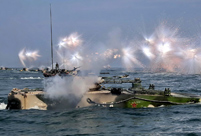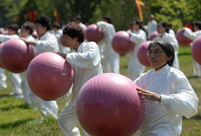 Amphibious armored vehicle unit conducts open sea drill
Amphibious armored vehicle unit conducts open sea drill
 Water relay in Henan
Water relay in Henan
 Ethnic culture feasts eyes of travelers
Ethnic culture feasts eyes of travelers
 80 security dogs assembled in Nanjing police dog training base
80 security dogs assembled in Nanjing police dog training base
 Graffiti artists paint on street walls in Xinjiang
Graffiti artists paint on street walls in Xinjiang
 Story of ceramic artist Zhang Lingyun
Story of ceramic artist Zhang Lingyun
 Magic summer night dream in Hongyuan
Magic summer night dream in Hongyuan
 Incredible creatures in headwaters drainage region of Lancang River
Incredible creatures in headwaters drainage region of Lancang River
 The future of rock n' roll seen in young rockers in China
The future of rock n' roll seen in young rockers in China
 Magnificent Yanziya Cliff
Magnificent Yanziya Cliff
Improving relations vital to regional security, says US secretary of state
Top US diplomat John Kerry has attempted to calm Sino-US ties ahead of a November visit to China by President Barack Obama.
The move by the secretary of state follows critical views on China voiced by top US officials, and tensions between the two countries over maritime and regional issues.
Improving US cooperation with China is critical to maintaining stability and security in the Asia-Pacific region as well as combating the effects of climate change, Kerry said on Wednesday after ending an eight-day round-the-world diplomatic trip.
"We are committed to avoiding the trap of strategic rivalry and intent on forging a relationship in which we broaden our cooperation on common interests and constructively manage our differences and disagreements," he said.
The comments on Sino-US ties formed part of Kerry's speech at the East-West Center in Hawaii, where he reiterated US commitment to the Asia-Pacific region.
There has been speculation that the situations in Ukraine and Iraq have left Washington overstretched and unable to focus on Asia-Pacific.
Kerry denied this, saying: "We will never forget the long-term strategic imperatives for American interests. ... Nowhere are those strategic opportunities clearer or more compelling than in the Asia-Pacific."
He also said that a constructive relationship between the US and China will contribute to maintaining regional peace and stability.
His tone on China was upbeat when compared with recent critical views voiced by top US officials.
Obama said in a recent interview with The Economist magazine that the West needs to be "pretty firm" with China as Beijing pushes to expand its role in the world economy.
At a Southeast Asia regional security forum in Myanmar last weekend, Kerry joined hands with the Philippines to announce a proposal calling for the freezing of further actions by all claimants in South China Sea disputes. The proposal was rejected by China and most countries in the Association of Southeast Asian Nations.
Qin Yaqing, vice-president of China Foreign Affairs University, said: "It is common sense that a country must cooperate with China to build regional order in East Asia. Thus, the Americans will not allow conflicts to affect the overall tone of China and the US, which is cooperation."
Yang Xiyu, a researcher at the China Institute of International Studies, said Washington's Asia-Pacific policy is problematic, as it faces challenges coming from the Middle East, Russia and China, with the first two becoming uncontrollable.
"But the challenge from China may also be an opportunity for the US, as the situation here is peaceful and stable."
Yang said Kerry's remarks mainly aim to create a good atmosphere for Obama's visit.
Obama will make his second trip to China in November for the Asia-Pacific Economic Cooperation forum meeting.
In 2011, Obama announced the US' rebalancing to Asia, with the Asia-Pacific region becoming the strategic focus for Washington, which enhanced its military presence in the area.
However, with the crises in Iraq and Ukraine, there has been talk that the US has begun to rethink its Asia-Pacific rebalancing strategy. But Kerry denied this and said Obama had asked him to redouble his efforts in the region.
Douglas Paal, vice-president for studies and director of the Asia program at the Carnegie Endowment for International Peace, said there is nothing new in Kerry's speech.
"This was another fervent effort to demonstrate that the US remains committed to the Asia-Pacific. Interestingly, the references to rebalancing were sparse, and there were no policy innovations or adjustment. So, long on rhetoric, short on substance."
 Beijing policewomen posters become a hit
Beijing policewomen posters become a hit Armored regiment trains on the sea
Armored regiment trains on the sea Children spend 'Father's Day' with dads at work
Children spend 'Father's Day' with dads at work 'Pan Da' appear in Shanghai World Financial Center
'Pan Da' appear in Shanghai World Financial Center Champions take selfies on podium
Champions take selfies on podium National Fitness Day celebrated around China
National Fitness Day celebrated around China Traditional culture colors summer vacation
Traditional culture colors summer vacation Young athletes fighting for their dreams
Young athletes fighting for their dreams 68 meters high thermometer in Shanxi, called ‘fighter’ of thermometers
68 meters high thermometer in Shanxi, called ‘fighter’ of thermometers The vanishing folk skills
The vanishing folk skills Intoxicating beauty of Dali, Yunnan province
Intoxicating beauty of Dali, Yunnan province Memorable moments of Ludian earthquake
Memorable moments of Ludian earthquake Bring world together to help elephant
Bring world together to help elephant 'Building Dreams'
'Building Dreams'  Labrang Monastery
Labrang MonasteryDay|Week|Month